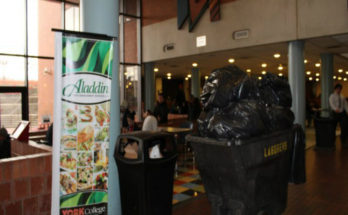By Anna Gleksman
Published: October 21, 2014
With fall starting and pumpkin spice lattes becoming a new daily ritual, it can be easy to pack on the pounds as the semester begins. Luckily for Brooklyn College students, there are all kinds of informative programs and seminars in effect to make this year your healthiest yet.
“It is easy to make the wrong decisions in terms of health and nutrition without even realizing it,” said Erena DiGonis, a nutritionist at the Commit to Being Fit event held early in the month. W.I.S.E. (Wellness Improvements Through Student Education) hosted the event that focused on what DiGonis called “fake healthy foods.”
According to DiGonis’s discussion, anything that may be deemed “healthier” or “fat-free” can mean it is loaded with hidden sugar. Any food item that has been stripped away of fat compensates with something else to make it taste appetizing.
DiGonis explained that reading the back label of foods that are deemed healthy is crucial, and that even protein bars may be high in sugar. According to her, flavored yogurts, for example, are deceptive because of the use of sugar and added natural components to sweeten them, such as honey or agave.
DiGonis also discussed sleep, deeming it the “key” to success and overall health. In a study done by the Centers for Disease Control and Prevention, of a group of 74,571 adult respondents in 12 states, 35.3 percent reported fewer than seven hours of sleep during a typical 24-hour period; 48.0 percent reported snoring, 37.9 percent reported unintentionally falling asleep during the day at least once in the preceding month, and 4.7 percent reported nodding off or falling asleep while driving at least once in the preceding month.
DiGonis also recommended vegetable juicing, saying it can contain crucial nutrients that the body needs.
“The key to energy is green smoothies,” she said. “As we all know, soda makes you crash, and so does sugar. An important component of energy consists of nothing more than some simple H2O.”
Another key component of a healthy lifestyle is hydration. It may seem a bit too good to be true, but sometimes all our body needs is not a stimulant, but water. Dehydration can be one of the leading causes for exhaustion, and some believe that our first instinct should be to engage in more habits to increase our energy.
“You do not make these drastic changes right away, [but] rather ease into them. As we all know, giving up things you love can be hard,” DiGonis stressed.
According to the CDC, movement is just as important as a healthy diet.
“You should get at least two-and-a-half hours of physical activity a week,” DiGonis said. “Regular activity helps improve your overall health and fitness. It also reduces your risk for many chronic conditions, such as high blood pressure, Type 2 diabetes, and obesity.”
In terms of aerobic activity, the Mayo Clinic suggests to “get at least 150 minutes a week of moderate aerobic activity or 75 minutes a week of vigorous aerobic activity.”
DiGonis also spoke about small efforts one can make to squeeze in exercise, like “[getting off] on the train or bus a few stops [earlier] than usual and walking the extra few blocks” to get to your destination.
According to DiGonis, health can be determined in many ways, such as mind, body, and spiritual wellness.Students have resources both on campus such as the Health Center to allow them to make healthier choices in everyday life. As the cold weather nears closer hopefully students will continue or begin to make healthier lifestyle habits while undergoing the fall semester.



